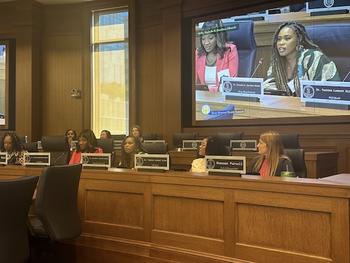In This Story
Rochelle Davidson Mhonde champions change-making data and statistics at the Black Maternal Health Legislative Summit

At George Mason’s College of Public Health, our faculty help drive public health policy. Rochelle Davidson Mhonde, assistant professor of Global and Community Health, was an invited panelist at the inaugural Black Maternal Health Legislative Summit hosted by the Virginia House of Delegates Speaker Don Scott and Delegate Candi Mundon King. Davidson Mhonde shared her expertise in a clinical and policy-making panel titled, “We Have the Data, Now What? Using Data and Statistics to Drive Policy Change.”
“The discussion included the complex issue of identifying the root causes of adverse outcomes and inequitable treatment of Black women in maternal health care,” Davidson Mhonde said. “This is set within the critical context of structural, social, and political determinants of health that created the disparities.”
According to the Virginia Department of Health, Virginia’s maternal mortality rate for Black mothers is more than double that of white mothers—as it is in much of the United States. Virginia’s maternal mortality rate averaged 14 per 100,000 among white women, but 38 among Black women. State governors committed to eliminating these disparities starting in 2019.
“One of the most impactful insights was listening to the testimonials of Black mothers who survived near-death experiences to share their perspectives on the healthcare system and the neglect and discrimination they experienced,” she said. “Their experiences brought depth to the statistics highlighted in the Maternal Health Strategic Plan for Virginia, which also states that Black women were ‘more likely to report experiencing discrimination or harassment due to their race/ethnicity or insurance or Medicaid status.’”

The summit provided a unique platform for stakeholders—including community-based organizations, health care providers, researchers, advocates, and legislators—to build coalitions to address structural inequities driving the disparities. Public health researchers should be at these gatherings, she noted, “because we can inform the necessary reforms and policy change with scientific evidence to support the community efforts that are advocating for equitable, respectful, and safe maternal care for Black mothers.”
Davidson Mhonde teaches community-engaged research methods and health equity theory courses in the Department of Global and Community Health. She is a Health Equity Scholar for Action, funded by the Robert Wood Johnson Foundation. Her research focuses on gender-based violence and reducing sexual, reproductive, and maternal health inequities due to racism and intersecting forms of oppression through applied health communication science. She is also a co-investigator with GCH Associate Professor Michelle S. Williams on a CPH Pilot Grant examining the intersections of access to reproductive care, maternal health outcomes, and HIV infection among Black women in the South.
